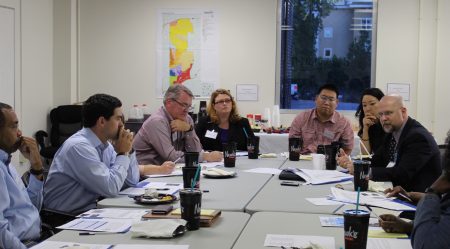David Schaefer loses sleep worrying about affordable housing in Brookhaven and the surrounding areas.
As director of Policy and Advocacy at the Latin American Association based in Brookhaven, Schaefer is chair of the city’s brand new volunteer 13-member Affordable Housing Task Force. The task force held its first meeting at City Hall Oct. 6.

“I care about our people. We’re citizens in Brookhaven … and I’ve been watching this process over the past two and a half years,” Schaefer said of rapid development in the city pushing out older, apartment complexes for new, luxury housing. Buford Highway, where the LAA is based and where many Latino and other immigrants live, also is ripe for redevelopment.
“Affordable housing keeps me up at night. The top two goals for me [for this task force] are equity and diversity,” he said.
City Manager Christian Sigman said he hoped the Task Force could come up with a policy recommendation by early next year. The city is under a zoning moratorium until February 2017, when the city is set to undergo a zoning rewrite.
“My role is to make sure what you do [leads to] serious policy discussion,” he said. “We want to give something to the City Council that they can stew on. If we’re doing our jobs right, we will make it difficult for them.”
What exactly is affordable housing in Brookhaven remains a question to be firmly defined by the Task Force. The U.S. government states housing costs at or below 30 percent of one’s income to be affordable.
The city pulled data from the 2015 Georgia Power Community Profile that shows Brookhaven has an average household size of 3.15 people with 45 percent of those households having an income base below $49,999.
For 2016, a household of three persons with an income level below $48,600 is considered to be low-income, explained Grants Administration & Fund Development Director Patty Hansen.
“This data then would indicate that 45 percent of families in Brookhaven, based on an average family size of three, are living in what is considered for our metro area to be low-income households, and between 14 to 20 percent in very low to extremely low households,” Hansen said.
Affordable housing is not just for people living in poverty. Teachers and police officers, for example, often spend more than 30 percent of their incomes on housing. In Sandy Springs, the City Council recently voted to rent a house it owns on Hammond Drive to public safety employees for $500 a month.
A map of Brookhaven shows the lowest salaries for families are in the southern portion of the city, specifically along Buford Highway, Sigman said. As incomes move north, they rise significantly.
“This is a national issue. This is a North Atlanta issue. People can’t afford a two-bedroom apartment on minimum wage. We’re not alone in this,” Sigman said.
Marian Liou, founder of We Love BuHi, said the role of the Task Force should go beyond ensuring people can afford to have a roof over their heads.
“We’re not just about providing shelter, but how do we also create opportunity so people do not have to fight this fight for a lifetime,” she said. “Economic mobility is part of this.”
Several Task Force members said they should not just focus on apartments, but also find ways to support people who want to buy their own houses. David Ellis, executive vice president of the Greater Atlanta Home Builders Association, said he knows developers who want to build affordable housing in Brookhaven, but community attitude toward apartments makes it impossible.
“The sentiment of the community is not supportive and builders say it would be easier for them to build luxury housing,” Ellis said.
The city’s tough tree ordinance oftentimes makes development difficult and expensive for builders, Ellis said, and local governments have a role to play, through zoning and process, to ensure all people can find an affordable place to live.
“Brookhaven has been the place where the market dictated you build bigger houses and sell for more money. At the same time, this leaves a disparity that is disconcerting to all of us,” Ellis said.
Brookhaven’s Affordable Housing Task Force was started after a dozen members of the city’s faith community sent a letter in June to the mayor and City Council urging them to consider affordable housing as it addresses the city’s rapid growth and development. The task force’s next meeting is Nov. 3.

David Ellis said, “he knows developers who want to build affordable housing in Brookhaven, but community attitude toward apartments makes it impossible.”
Community attitude toward apartments encompasses far more than just an inaccurate statement as that. Why does affordable housing automatically trigger apartments? Why shouldn’t everyone have the opportunity to own their home? Do you think that the 650 sf apartments many times proposed is a sufficient size for a family as compared to existing available apartment sizes? Especially at the rental prices they also suggest? Our pricing gap is a huge problem in Brookhaven for those at the current low-income levels AND those on a fixed income. Please think broader than just apartments when referencing affordable housing. Try to incorporate some middle-housing options.